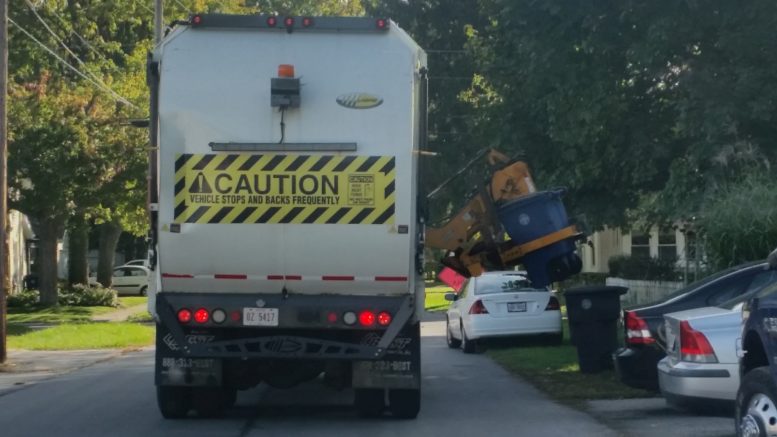By JAN LARSON McLAUGHLIN
BG Independent News
Starting on Thursday, when Bowling Green citizens toss recyclables in their bins, they will be trucked up to Toledo to Republic Services.
Also starting with the new year, residents will be paying $2 more a month for trash and recyclable collections.
Bowling Green City Council voted Monday evening to enter a contract with Republic to handle the city’s curbside recycling items. Much will remain the same for city residents – they will still use their blue recycling bins, which will be collected on the same day as usual, by the same city crews as usual.
The major difference will be that Republic will accept more items – like glass, more types of plastics, and paperback books.
Bowling Green Recycling Center will continue to take drop-off items, but will no longer handle items collected curbside.
The vote to contract with Republic Services was unanimous. The vote to raise the existing $13 a month garbage/recycling fee to $15 had one dissenter – council member Greg Robinette.
“I wish we would have spent more time discussing options to the $2 fee,” Robinette said prior to the vote.
Though he supported the overall city budget proposal, Robinette said he wasn’t sold that the fee increase was necessary. The fee increase was first recommended earlier this month as a way to make up for the shortfall forecasted in the city’s budget next year. The $2 a month increase would raise an additional $133,000 a year.
Council member Bill Herald voted in favor of the budget, but shared those concerns about the fee hike.
“I agree with Greg. It would have been better, I think, to not increase the rate,” Herald said.
Council member Sandy Rowland said that raising fees is never easy.
“I’m not happy about this,” she said. But the $2 increase was the best option to take care of the budget shortfall.
Council member John Zanfardino agreed with Robinette’s prior suggestion that more finance committee meetings be held throughout the year. However, “with recycling being perhaps at stake,” Zanfardino said he would vote for the increase.
Council President Mike Aspacher said the fee hike was not considered lightly.
“We must always be mindful of the effect increasing fees have on our residents,” he said. But Bowling Green residents clearly want recycling, he added.
“Our citizens do see this as a value to our community,” Aspacher said.
Earlier this fall, the Bowling Green Recycling Center requested that its current funding be increased from $80,000 to $215,000 a year.
So Municipal Administrator Lori Tretter asked City Council to allow the administration to seek other bids to accept city recyclables. Council agreed. One proposal was submitted by Republic.
But Robinette pointed out that while the city only received one bid, it has two options.
“I just want to make sure we understand there is a second option – that’s no recycling,” he said. “I think it’s important that as a body we understand the costs of everything.”
Robinette suggested that the issue will need further discussion next year.
“We’ve got to decide as a council if we can sustain this,” he said. “Even if we all love recycling,” is it affordable, he asked.
The local recycling center offered to continue operating the 24-hour drop-off site for $24,000 a year. The drop-off site takes in about 1,000 tons of recyclables a year.
Bowling Green Recycling Center officials said they could no longer afford to operate the facility at the current rate from the city – and were losing money after changes experienced in the industry.
A combination of market changes, declining newspaper products, and China’s refusal to buy American recyclables has created an upheaval in recycling programs nationwide.
The Republic proposal charges the city $172.75 per ton for recyclables. The city collects 700 tons curbside each year now – and the addition of glass could increase that to 1,100 tons a year.
That adds up to about $190,025 a year. However, Republic also has a rebate business model that shares the money earned by the sale of the recyclables. That rebate would fluctuate a lot, but it could drop the city’s annual cost to about $164,000.
Worst-case scenario, without any rebate, the city will pay $190,025 for curbside and $24,000 for drop-off recycling – a total of $214,025.
The city will also use its trucks to transport the recyclables to Republic’s Toledo location. Tretter estimated the trucks would make one or two trips there each week – and will actually help the diesel engines reach higher speeds needed to burn off contaminants.
Republic handles recyclables for many area communities, like Toledo, Perrysburg, Oregon and Sylvania.





